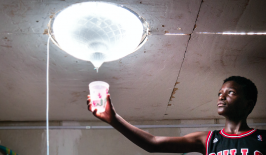The threat of drought is a constant for most farmers. Often lacking insurance cover altogether, small-hold farmers are particularly at risk from the consequences of a failed crop, which can mean not just reduced income, but also a reduced ability to feed their families and school their children. A peer-to-peer insurance provider seeks to help farmers in developing countries mitigate climate-influenced risks, and automatically pays out when the going gets tough.
Climate change, fluctuations in weather patterns and droughts all have a significant impact on agroculture, particularly on crop yields. In March of this year, Brown University published results of a study looking at climate change’s impact on agriculture in Mato Grosso, Brazil, suggesting that the effects of global warming on farming may have been underestimated. According to its analysis, an increase of one degree celsius in average temperature in the region could spells reductions in corn and soy production between one and 13 per cent. Currently, Morocco is dealing with its driest start to winter in 20 years, which is wreaking havoc on local wheat yields. These inconsistencies in agriculture not only hit the planet’s food supply, they also have massive repercussions on farmers, their families and the economy of entire regions
WorldCover is a peer-to-peer lending platform that seeks to assist farmers in dealing with natural disasters and unpredictable weather patterns. On the investment side, the platform offers investors the chance to secure financial returns that are not susceptible to financial crashes. The platform was founded in 2015 by two former financial managers and seeks to use finance to help solve broader social problems,while also enabling ethical investors to grow their wealth. The initial way it aims to do this is to protect small farmers at risk from weather events, 90 per cent of whom lack insurance cover.
Here’s how it works: like all insurance schemes, farmers pay a premium for coverage. Investors put a sum of money into WorldCover and receive a portion of the premium that farmers pay as a return on investment. In the event that money needs to be paid to a farmer (most commonly when there is a drought), the funds that investors have put into WorldCover are used to cover the paypout. WorldCover is currently aiming to provide coverage to 200,000 farmers throughout Africa as well as to farmers in other parts of the world.
The platform relies on satellite technology to monitor and record weather patterns and conditions, and to issue automatic payments in case of drought. Small farmers can therefore relax in the knowledge that should the rains fail, they will not only be covered, but will be so without the need to engage in time-consuming bureaucracy to file their claim.
While the financial security of small farmers experiencing drought is currently a top priority, WorldCover also aims to enable investors to receive above-market returns for below-market risks. Whether a coffee farming in Peru, or maize farming in Ghana, WorldCover’s investment portfolio is tied to natural risks, rather than the workings of the financial market and the Stock Market Index S&P 500.
As climate change‘s impacts on droughts continue to affect the poorest in developing countries the most, any tool that provides a safety net during such difficult times is therefore vital to help build the resilience of communities, and to prevent the displacement of people. What will be particularly interesting to monitor will be how an increase in fluctuating weather patterns and droughts in some areas of the world will effect an initiative like WorldCover.
Here’s a short video on the causes and effects of drought:



